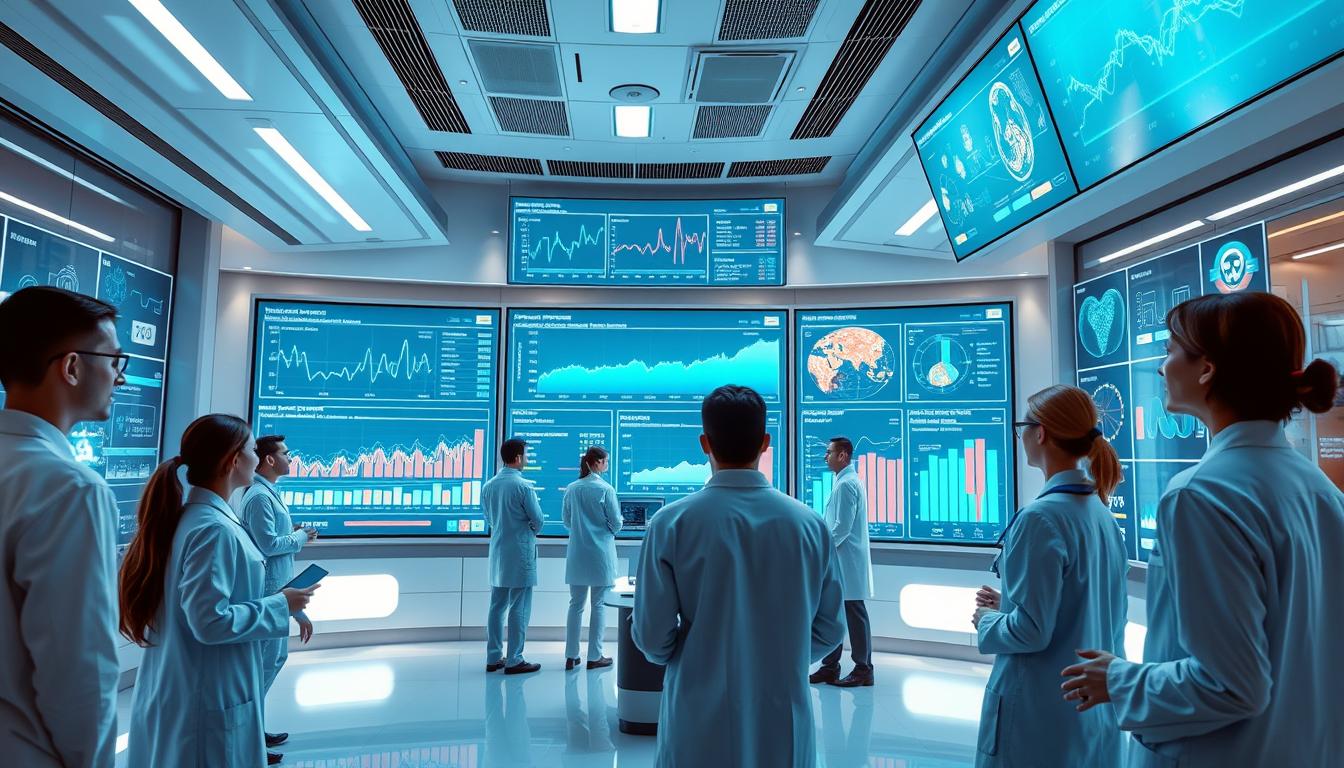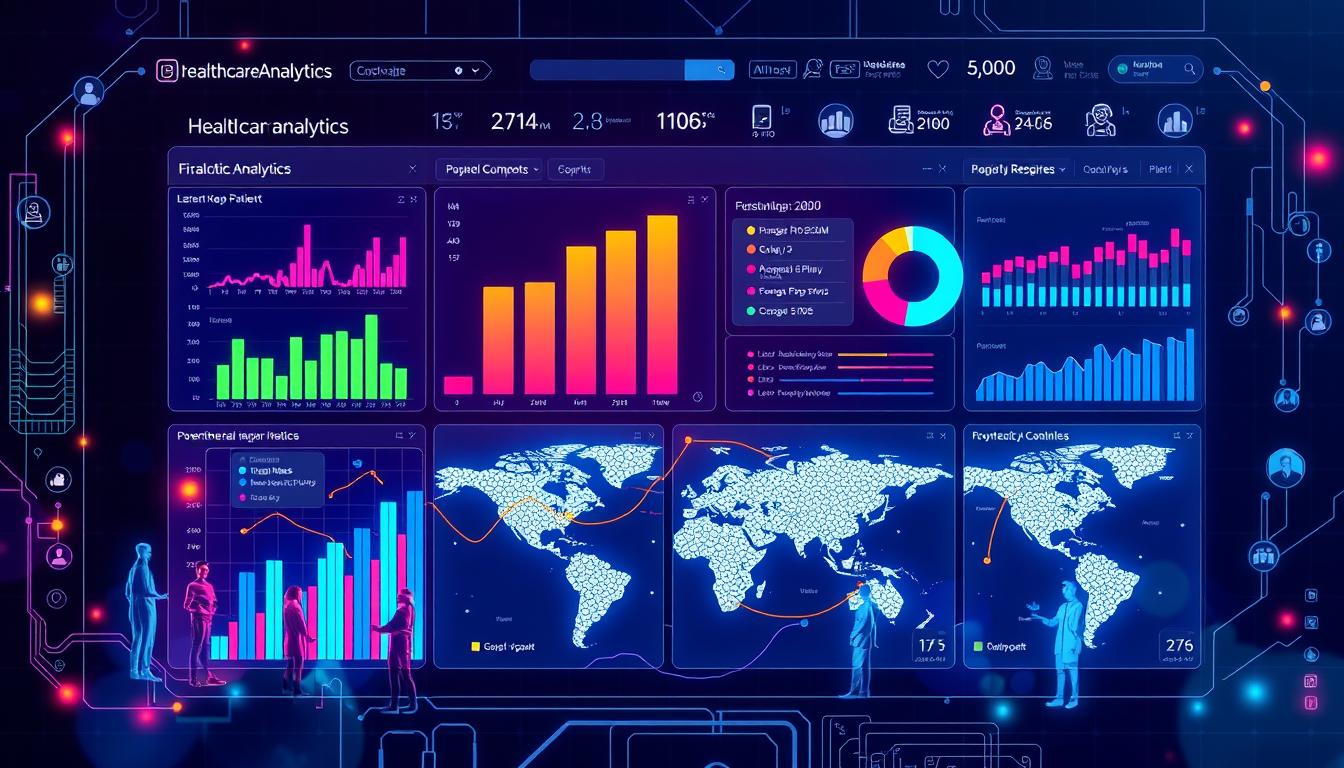Healthcare analytics is a fast-growing field changing the healthcare world. Big data analytics helps in many ways, like better patient care and cost savings. It helps find people at risk, improve treatments, and understand health impacts.
It also gives insights to healthcare leaders. This helps them make data-driven decisions to improve care and efficiency. With more jobs needed, healthcare analytics offers great career opportunities for those who want to use data to help health.
Key Takeaways
- Healthcare analytics is a rapidly growing field that uses big data and advanced analytics to improve patient care, operational efficiency, and cost savings.
- Key applications of healthcare analytics include identifying at-risk individuals, improving diagnosis and treatment, addressing health disparities, and analyzing environmental factors.
- Healthcare analytics provides valuable insights to administrators, enabling data-driven decisions that enhance operational efficiencies and patient satisfaction.
- The demand for qualified healthcare analytics professionals is high, creating ample job opportunities for those with the right mix of technical skills and healthcare industry knowledge.
- Leveraging healthcare analytics can lead to measurable improvements, such as $45 million in performance savings, 7x faster COVID-19 testing, and 16% reduction in 30-day emergency department returns.
Introduction to Healthcare Analytics
Healthcare data analytics is a fast-growing field. It uses data to change the healthcare industry. By looking at different types of healthcare data, experts can find ways to help patients, save money, and make things run better.
Definition and Scope of Healthcare Analytics
Healthcare analytics uses data analysis in healthcare. It includes many tasks, like finding people at risk and improving how we diagnose and treat patients. It also helps address health gaps and look at how the environment affects health.
The Role of Big Data in Healthcare
The healthcare world makes a lot of data. Big data is key in this field. With advanced tools, healthcare groups can find important insights and make better choices. They use data to improve care, make things run smoother, and get better results.
A study found that 90% of healthcare leaders think data analytics is very important. They see it as key for reporting, improving quality, and tackling population health. As healthcare changes, the need for skilled analytics experts will grow. This opens up great career paths for those with the right skills.
| Healthcare Analytics Strategies | Description |
|---|---|
| Descriptive Analytics | Creates a historical narrative of healthcare events |
| Diagnostic Analytics | Identifies trends and explains them |
| Predictive Analytics | Forecasts future events based on past and current data |
| Prescriptive Analytics | Suggests actions in response to predictions |
By using these analytics strategies, healthcare groups can get valuable insights. They can make better choices to help patients, improve how things run, and get better results overall.
“Healthcare data analytics has the potential to revolutionize patient care for a more proactive and personalized healthcare approach.”
Key Applications of Healthcare Analytics

Healthcare analytics is changing how we care for patients and manage health in communities. It uses advanced methods to spot at-risk individuals and improve diagnosis and treatment. This helps tackle big challenges in healthcare.
Identifying At-Risk Individuals
Predictive analytics helps find patients at risk of chronic diseases or health problems. It looks at electronic health records and claims data. This way, it predicts who might get diseases like diabetes or cancer.
Healthcare teams can then create special care plans for these patients. This approach improves health outcomes and lowers costs.
Improving Patient Diagnosis and Treatment
Prescriptive analytics changes how doctors treat patients. It considers a patient’s genes, medical history, and more. This leads to the best treatment, like specific medicines or surgeries.
This personalized medicine is showing great results, especially in cancer care. Treatments tailored to a patient’s genes are leading to better health outcomes.
Healthcare analytics also helps make disease diagnosis more accurate. Machine learning can quickly check medical images for signs of disease. This could lead to earlier and more effective treatments.
“Healthcare data analytics is projected to reach a global market value of $78 billion by 2027, underscoring its growing importance in the industry.”
As analytics become more common in healthcare, we can expect better patient care and lower costs. By using data insights, healthcare is ready to offer more tailored and effective care.
Healthcare Analytics

Healthcare analytics can find and fix big health gaps in communities. It uses predictive models to spot disease patterns. This shows us the social, economic, and environmental reasons behind these gaps. With this info, healthcare teams can make special plans to manage diseases and fix the root causes of health gaps.
Also, healthcare analytics is key in understanding how the environment affects diseases. Tools like natural language processing and computer vision help us see how air pollution, water, sanitation, and industrial waste cause diseases. With this knowledge, healthcare groups can make plans to lessen the harm from these environmental factors. This helps improve public and mental health.
Embracing the Data Lakehouse for Comprehensive Insights
The data lakehouse is changing healthcare analytics. It’s a single place for all kinds of data. This lets healthcare teams mix different data into one picture. With the data lakehouse, they can make smarter choices, better care, and work more efficiently.
| Benefit | Impact |
|---|---|
| Near-limitless concurrency | Empowers instantaneous reporting and granular data distribution |
| Diverse data access | Enables the power of AI models, algorithms, reports, and dashboards |
| Rapid turnaround and recovery | Facilitates evidence-based assessments and optimized medical costs |
Using the data lakehouse, healthcare groups can find out why health gaps exist. They can also see how the environment affects health. This helps them make big plans to fix these problems. It makes healthcare better and fairer for everyone.
Benefits for Healthcare Providers and Administrators

Healthcare analytics offers big benefits for both providers and administrators. For providers, it leads to better patient care, lower costs, and more operational efficiency. It helps spot at-risk patients, improve treatment plans, and use resources wisely. This means better patient outcomes and happier patients.
For administrators, analytics gives valuable business intelligence for making data-driven decisions. They can look at data on staff, finances, and patient satisfaction. This helps find ways to cut costs and boost the health organization’s performance. Programs like the Hospital Value-Based Purchasing (VBP) Program encourage using data analytics.
Operational Efficiencies and Cost Savings
Healthcare analytics boosts operational efficiencies and cost savings in many ways. It helps find areas to improve, better staff schedules, and make admin processes smoother. This leads to more productivity, less waste, and smarter use of financial resources.
Improving Patient Satisfaction and Outcomes
Analytics also plays a key role in better patient satisfaction and outcomes. It helps identify high-risk patients, customize treatments, and improve patient care quality and safety. This results in a more personalized and effective healthcare experience. It leads to happier patients and better health results.
As healthcare leaders face more challenges, using data analytics is crucial. It drives innovation, enhances patient care, and ensures the healthcare system’s future.
“The role of hospital administration has expanded over the years to encompass patient-centered care, data-driven decision-making, and strategic planning, reflecting a broader scope of responsibilities within healthcare institutions.”
The Future of Healthcare Analytics
The future of healthcare analytics is bright, thanks to new technology. Artificial intelligence, machine learning, and the Internet of Things will make healthcare smarter. We’ll see better predictions, tailored treatments, and constant patient monitoring.
New telemedicine and wearable devices will create lots of data. This data will help manage health better and focus on value. But, we must tackle data bias and ensure data diversity to avoid worsening health gaps.
Working together is key. Healthcare providers, tech companies, regulators, and policymakers must team up. Leaders with an Executive Master of Health Administration (EMHA) degree will lead the way. They’ll make sure data analytics is used right, improving care for everyone.
“The future of healthcare lies in the power of data analytics to transform how we deliver care, enhance patient outcomes, and drive innovation across the industry.”
Also Read : What Is Health Policy And Why Is It Crucial For Public Health?
Conclusion
Healthcare analytics is changing the healthcare world fast. It can make patient care better, cut costs, and make operations smoother. By using predictive and prescriptive analytics, healthcare teams can spot risks early and tailor treatments. This helps tackle health gaps and understand how the environment affects diseases.
Healthcare analytics benefits both doctors and managers. It leads to happier patients, better health, and more efficient businesses. As healthcare evolves, using data analytics will be key. It will drive new ideas, ensure fair care access, and train future leaders.
Healthcare pros with the right skills can shape the industry’s future. They can improve community health. But, the sector must tackle issues like data bias and diversity. It must also use big data well to fully benefit from analytics.
FAQs
Q: What is healthcare analytics and how does it relate to the healthcare system?
A: Healthcare analytics refers to the systematic use of data analytics to analyze health data within the healthcare system. It plays a crucial role in improving patient care, optimizing healthcare services, and enhancing decision-making processes in healthcare organizations.
Q: Why is healthcare data analytics important for healthcare professionals?
A: Healthcare data analytics is important for healthcare professionals because it provides actionable insights that can guide clinical decisions, improve patient outcomes, and streamline healthcare delivery. By leveraging health data, professionals can identify trends and patterns that influence patient care.
Q: How do analytics tools contribute to the healthcare industry?
A: Analytics tools are essential in the healthcare industry as they enable data visualization, real-time analysis, and the generation of dashboards. These tools help healthcare organizations to monitor performance, assess the effectiveness of treatments, and make informed decisions based on data-driven insights.
Q: What types of healthcare analytics solutions are available for health systems?
A: There are various healthcare analytics solutions available for health systems, including predictive analytics, clinical analytics, and operational analytics. These solutions help in revenue cycle management, optimizing healthcare costs, and improving overall healthcare services.
Q: How can healthcare analytics software improve patient care?
A: Healthcare analytics software enhances patient care by providing healthcare organizations with the ability to analyze patient data effectively. This analysis can lead to better treatment plans, more personalized care, and improved health outcomes for patients, aligning with the principles of value-based care.
Q: What role do data analysts play in healthcare analytics?
A: Data analysts play a vital role in healthcare analytics by collecting, processing, and interpreting health data. They utilize analytics solutions to derive insights that can help healthcare organizations make strategic decisions and improve patient care through informed actions.
Q: How does health informatics relate to healthcare analytics?
A: Health informatics is closely related to healthcare analytics as it involves the use of information technology to manage health data. By applying healthcare analytics within health informatics, organizations can enhance data management, improve clinical workflows, and ultimately provide better healthcare services.
Q: Can a certificate in healthcare analytics help in career advancement?
A: Yes, obtaining a certificate in healthcare analytics can significantly enhance career advancement opportunities. It equips professionals with the necessary skills in data analysis, health informatics, and the use of analytics tools, making them valuable assets in the healthcare sector.
Q: What are the benefits of using analytics solutions in health plans?
A: The benefits of using analytics solutions in health plans include improved risk management, enhanced patient engagement, and the ability to reduce healthcare costs. These solutions also help payers to optimize their services and improve the overall efficiency of the healthcare ecosystem.


